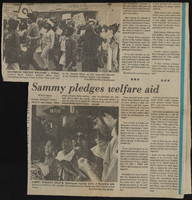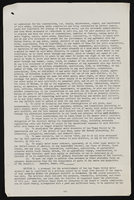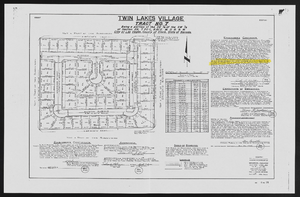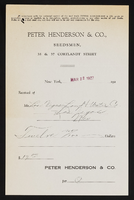Search the Special Collections and Archives Portal
Search Results
Audio recording clip of interview with D. D. Cotton by Claytee D. White, February 14, 1997
Date
Archival Collection
Description
Part of an interview with D. D. Cotton by Claytee White on February 14, 1997. Cotton discusses challenges faced by women dealers and her work as a dancer and dealer in a number of casinos.
Sound

Transcript of interview with Brian Cram by Stefani Evans and Claytee White, October 28, 2016
Date
Archival Collection
Description
Throughout his career, former Clark County School District Superintendent (1989–2000) Brian Cram took his father's words to heart. He heard them repeatedly over the years as he watched and later, helped, his father clean classrooms at Robert E. Lake Elementary School: this place—the classroom—this is the most important place. Cram was born in Caliente, where his father worked on the railroad. In 1939, when Cram was a toddler, the family moved to Las Vegas and his father found work first as a sanitation engineer at a hospital, and then at CCSD as a custodian. The elder Cram, who spent his formative years in the Great Depression, prided himself on doing "good, honorable work" as a custodian, because the work—the classroom—mattered. Even so, he wanted more for his son. Cram largely ignored his father's advice during his four years at Las Vegas High School, where he ran with The Trimmers car club, wore a duck tail and a leather jacket, and copped an attitude. Cram's swagger, though, d
Text

Transcript of interview with Celia Rivero Grenfell by Patricia Hollard, March 31, 1977
Date
Archival Collection
Description
On March 31, 1977, Patricia Holland interviewed Celia Rivero Grenfell (born 1926 in Las Vegas, Nevada) about her life in Southern Nevada. Grenfell first talks about her family background in Mexico and later describes her family’s restaurant business. She also describes her education, recreational activities, Downtown Las Vegas, and Helldorado. The two also discuss racial segregation and prejudice, the El Rancho Vegas, Lorenzi Park, early churches, environmental changes, early air conditioning, and Grenfell’s early work in a laundry business.
Text

Interview with Jeannette (Jean) M. (Mactaggart) Crooks, July 21, 2004
Date
Archival Collection
Description
Text






